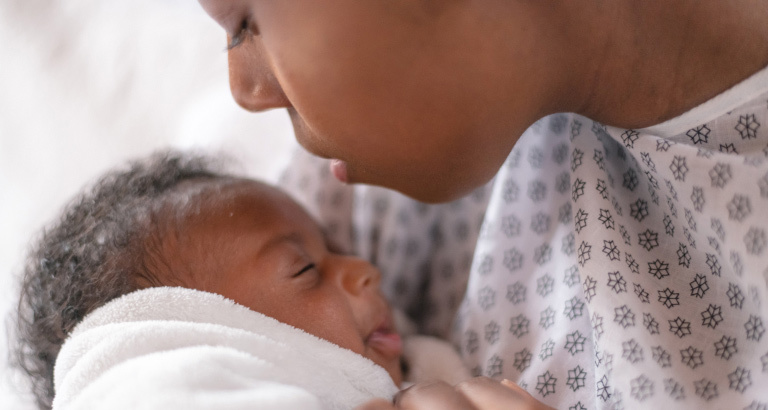Preterm birth rates: they’re all over the map

About one in ten babies is born too early in the United States Preterm birth – a birth that occurs before 37 completed weeks of pregnancy – is one of the leading causes of infant mortality in the US, and the higher rate of preterm births among Black infants is a main driver of the wide Black/White infant mortality gap. Tragically, Black infants are more than twice as likely as white infants to die before their first birthdays.
Researchers have long searched for explanations for the higher rates of preterm birth among Black infants so we can develop effective prevention strategies and ultimately save lives. Typically, we look to factors like income, education, and other “social determinants” to explain why we see patterns in preterm birth – but these factors do not fully explain the racial inequities we see. A Black person with a Ph.D. is still more likely to deliver preterm than a White high school dropout.
When health researchers present health data stratified by race, we usually describe that group as a whole. For instance, we will report, “the Black/African American preterm birth rate in the United States,” end of story. But in Massachusetts, we have a remarkably diverse group of people who identify as “Black,” hailing from dozens of countries around the world, with wildly varying exposures, concurrent and intergenerational. People migrate to the US for all sorts of reasons: to pursue opportunities like a job or higher education, or to escape extreme deprivation or political strife. Moreover, migrants to the US from around the world carry with them intergenerational histories which may include a royal lineage for some or colonialism and enslavement for others. Epigenetic science suggests that adverse health outcomes may be transmitted across generations through a genome literally altered by oppression and trauma.
Knowing this, it makes sense to parse racial groups by regions or countries of origin if we can. While there’s no denying that racism in the US depends heavily on skin color regardless of personal history or nationality, where you “come from” has implications for many determinants of health, and for the risk for something like preterm birth.
We examined preterm birth among singleton infants born in Massachusetts to people identifying as non-Latinx Black. This included birthing parents from the US and 18 other countries for which we had at least 100 births represented. What we found was even more striking than we had expected.
As the figure above shows, preterm birth rates ranged widely from only 4% among Angolese birthing parents to 12.6% among those from Trinidad and Tobago as well as Barbados, a more than three-fold difference. We adjusted for a variety of social and health factors in our analysis, but little changed – the rates still varied considerably, and birthing parents from sub-Saharan African countries generally had a lower risk of preterm birth than those from Caribbean countries or the US.
So, what do we make of this, and how does this inform our future public health solutions toward closing the racial gap in preterm birth? Well first, it’s evident that there is no one “Black preterm birth rate”. While it should be abundantly clear at this point, our findings further confirm that race as we define it in the US is not a meaningful category when it comes to biology and health— though unfortunately, it remains quite a powerful determinant of health outcomes via the social experience of race (i.e. racism).
Our findings also suggest that there is a generally higher risk of preterm birth for non-Latinx Black people who are either US-born or from the Caribbean compared to those from sub-Saharan African countries. Can we say definitively that this is associated with these regions’ different colonial histories or perhaps the duration of time spent in the US before giving birth? Not with the data we have available to us. But our findings are suggestive that both present-day and possibly cumulative and even intergenerational experiences may be of interest to researchers hoping to understand the racial gap in preterm birth in the US.
Is there one “Black preterm birth rate”? No, it truly is all over the map.
Acknowledgments: This research was conducted in collaboration with colleagues Joanna Almeida, ScD (Simmons University), and Mayowa Alade, MBBS, MPH (Boston University). Data were provided to us by the Massachusetts Department of Public Health.
Candice Belanoff, ScD, MPH, is a Maternal and Child Health Epidemiologist and Clinical Associate Professor at Boston University School of Public Health with a particular interest in the relationship of social forces and inequities to patterns of population health. She is currently investigating associations between measures of structural racism and the occurrence of preterm birth and other adverse perinatal outcomes.
Mayowa Alade, MBBS, MPH is a second-year DrPH student at the Boston University School of Public Health and a medical doctor by training. Prior to starting the DrPH program, she worked with the World Bank in Nigeria, where she provided technical support for maternal and child health (MCH) programs focused on improving access and quality of MCH services.
Joanna Almeida, ScD, MPH, MSW, is an Associate Professor at the Simmons School of Social Work, Simmons University. Dr. Almeida’s research centers on the social determinants of health inequities.




